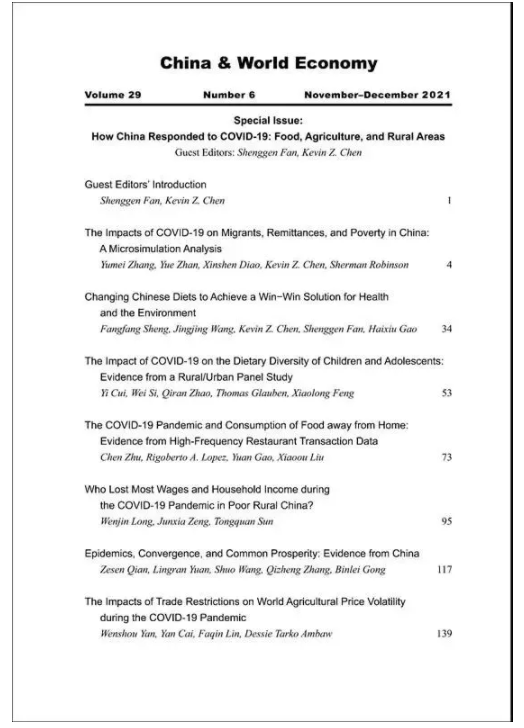浙江大学中国农村发展研究院国际院长、IFPRI资深研究员陈志钢教授与中国农业大学全球食物经济与政策研究院(AGFEP)院长、IFPRI前所长樊胜根教授共同组织的《中国与世界经济》(China & World Economy,CWE)特刊“How China Responded to COVID-19: Food, Agriculture, and Rural Areas”发布。
特刊收录“The Impacts of COVID-19 on Migrants, Remittances, and Poverty in China: A Microsimulation Analysis”、“Changing Chinese Diets to Achieve a Win−Win Solution for Health and the Environment”等七篇文章,讨论了新冠疫情对农民工收入、健康膳食、农产品价格等问题的影响。
Special Issue:
How China Responded to COVID-19: Food, Agriculture, and Rural Areas
Guest Editors: Shenggen Fan, Kevin Z. Chen
The Impacts of COVID-19 on Migrants, Remittances, and Poverty in China: A Microsimulation Analysis
Yumei Zhang, Yue Zhan, Xinshen Diao, Kevin Z. Chen, Sherman Robinson
China & World Economy / 4–33, Vol. 29, No. 6, 2021
Abstract
Chinese migrant workers are very exposed to the shocks caused by the COVID-19 pandemic. Falling remittances adversely affect their families who rely on remittance incomes. The impacts of COVID-19 on migrants and remittance-receiving households are assessed using a nationally representative household dataset and a microsimulation model. We found about 70 percent of migrant workers lost part of their wage income during the pandemic lockdown period and rural migrants working in small and medium enterprises were affected the most. This led to about 50 percent of remittance-receiving households being affected adversely by falling remittances, and the average decline in such income was more than 45 percent. Nearly 13 percent of pre-pandemic nonpoor remittance-receiving households could fall into poverty, raising the poverty rate among remittance-receiving households by 4 percentage points. Many households that were poor prior to the pandemic became more impoverished. The results indicate that social protection programs targeting vulnerable migrants and their families at home are important.
Changing Chinese Diets to Achieve a Win−Win Solution for Health and the Environment
Fangfang Sheng, Jingjing Wang, Kevin Z. Chen, Shenggen Fan, Haixiu Gao
China & World Economy / 34–52, Vol. 29, No. 6, 2021
Abstract
Diets are key determinants of nutrition and health and play a significant role in the environment. In this article, we aim to (i) describe dietary transitions and health in China and the consequent environmental challenges; (ii) identify differences between current Chinese diets and healthy reference diets; (iii) conduct a systematic review assessing the health impacts of four reference diets on the Chinese population, and (iv) simulate changes in greenhouse gas emissions under different diet scenarios. The results show differences between the Chinese diets and reference diets, with the current Chinese diet including mainly grains (especially refined rice), excessive meat consumption, and insufficient consumption of fruit and milk. If all Chinese consumers adopt one of the healthy reference diets all the time, the incidence of diet-related chronic disease and mortality would be significantly reduced. Such dietary shifts would also reduce greenhouse gas emissions by 146–202 million tons (18–25 percent) compared with the projected emissions level in 2030.
来源:国 际 食 物 政 策 研 究 所
International Food Policy Research Institute (IFPRI)



